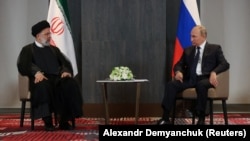The United States is seeking to expose and disrupt the growing defense partnership between Russia and Iran.
To date, during its full-scale invasion of Ukraine, Russia has received hundreds of drones from Iran, which it has used to attack Ukraine’s infrastructure and kill Ukrainian civilians.
Now, as National Security Coordinator for Strategic Communications John Kirby said in a statement, “The Russia-Iran military partnership appears to be deepening.”
“We have information that Russia is receiving materials from Iran needed to build a UAV manufacturing plant inside Russia,” he said. “This plant could be fully operational early next year.” The White House released an image of the industrial site of the prospective plant east of Moscow.
The defense partnership is a two-way street. Strategic Coordinator Kirby said Russia has offered Tehran “unprecedented” defense cooperation, including through missiles, electronics, and air defense. “We are continuing to use all the tools at our disposal to expose and disrupt these activities, including by sharing this with the public, and we are prepared to do more,” said Mr. Kirby.
On June 9, the U.S. Departments of State, Commerce, Justice, and Treasury issued an advisory to industry on Iran’s UAV-related activities. Strategic Coordinator Kirby explained why in an interview with the Voice of America:
“We want to make sure that private entities, certainly, technology companies understand the risks of their products potentially ending up in Iranian hands to be used for the manufacture of Iranian drones, in this case, that can be used to kill innocent Ukrainian people. So the purpose of the advisory was really to make sure that the business community understands our concerns and are taking a look at their own processes and procedures.”
In a statement also expressing grave concern over Russia and Iran’s growing military cooperation, U.S. Ambassador to the United Nations Linda Thomas-Greenfield noted that Russia and Iran’s actions violate UN Security Council Resolution 2231. That resolution “prohibits all countries – including permanent members of the UN Security Council – from transferring these types of weapons from Iran.”
Ambassador Thomas-Greenfield said, “There is an urgent need to respond to calls from the international community to investigate these violations. Doing so could save lives . . . The United States,” she declared, “will continue working with partners to expose and disrupt these destabilizing activities.”














